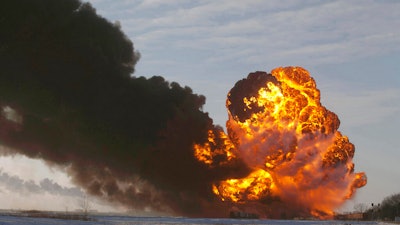
OMAHA, Neb. (AP) — An appeals court has rejected the Trump administration's decision to drop a proposal to require freight trains to have at least two crew members, a plan that was drafted after several fiery crude oil train derailments.
The ruling Tuesday from the 9th U.S. Circuit Court of Appeals will likely make it harder for the railroad industry to reduce the number of crew members in most trains from two to just one. It opens the door for states to require two-man crews on freight trains that haul crude oil, ethanol and other hazardous commodities.
The court ruled that the Federal Railroad Administration acted arbitrarily when it dropped the safety measure President Barack Obama's administration drafted in response to explosions of crude oil trains in the United States and Canada. The FRA said in 2019 that safety data didn't support requiring two-man crews on all freight trains.
The 2016 proposal followed oil train derailments including a runaway oil train in 2013 that derailed, exploded and killed 47 people while levelling much of the town of Lac Megantic, Canada. Other derailments of trains carrying oil and ethanol have occurred in North Dakota, Oregon, Montana, Illinois, Virginia and other states.
Rail labor groups, which have maintained that single-person crews would make trains more accident-prone, praised the ruling. Greg Regan, president of the AFL-CIO's Transportation Trades Department coalition, said the decision “overturned one of the most indefensible decisions by the previous FRA.”
“With this decision, the United States Court of Appeals for the Ninth Circuit put common sense and safety ahead of profits and political favoritism,” Regan said.
Washington state Attorney General Bob Ferguson said the court's ruling should clear the way for his state's law requiring two-person crews to take effect. Currently, two-person crews are generally the norm in the industry but freight railroads have proposed cutting that to one in contract talks now that railroads nationwide have installed an automatic braking system
“The Trump administration unlawfully attempted to impose a national one-person crew standard that jeopardizes our environment and Washingtonians’ safety,” Ferguson said. Washington, California and Nevada all challenged the FRA's decision on crew sizes.
An FRA spokeswoman declined to comment while the agency is reviewing the court's ruling.
The Association of American Railroads trade group said the ruling would hamstring the industry's efforts to increase automation, and it is evaluating whether to appeal.
“Railroads are frustrated and perplexed by the 9th Circuit’s decision. The panel rejected robust data, sound reason and well-established law in favor of judges’ personal opinions on how the expert rail safety agency should evaluate safety data and how the railroads should operate their trains," AAR spokeswoman Jessica Kahanek said.
The railroad industry has argued that the installation of an automatic braking system on nearly 58,000 miles of track nationwide, which was completed last year, helps make the second person in a locomotive's cab unnecessary.
The $15 billion braking system, known as positive train control, is aimed at reducing human error by automatically stopping trains in certain situations like when it’s in danger of colliding, derailing because of excessive speed, entering track under maintenance or traveling the wrong direction because of switching mistakes.
Currently, two-person crews are required in most of the industry's labor contracts, but railroads have proposed eliminating that rule.






















